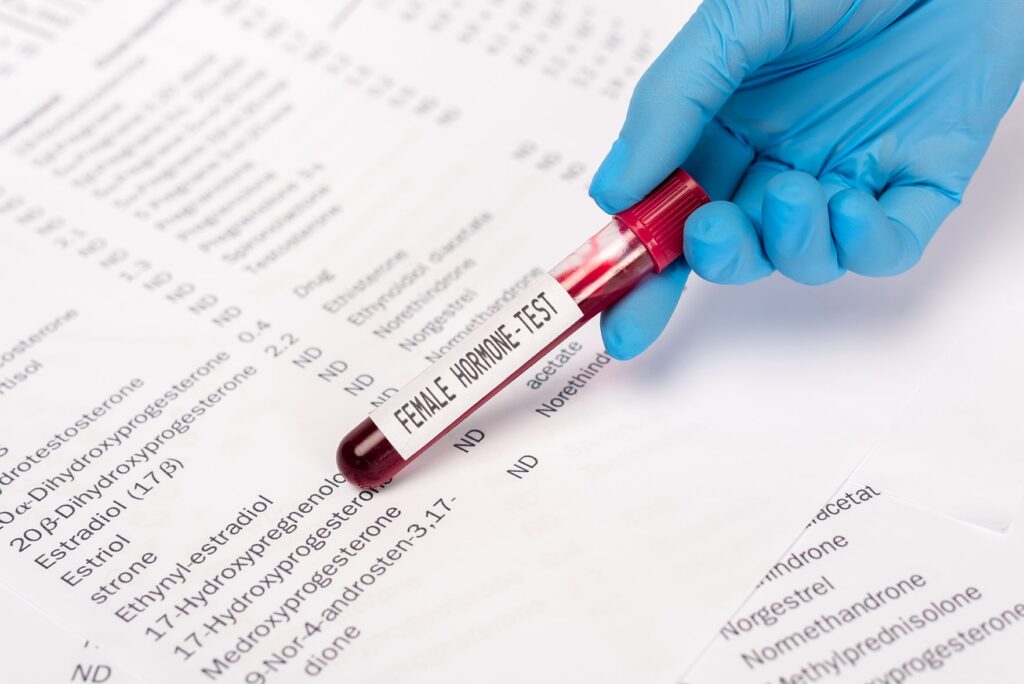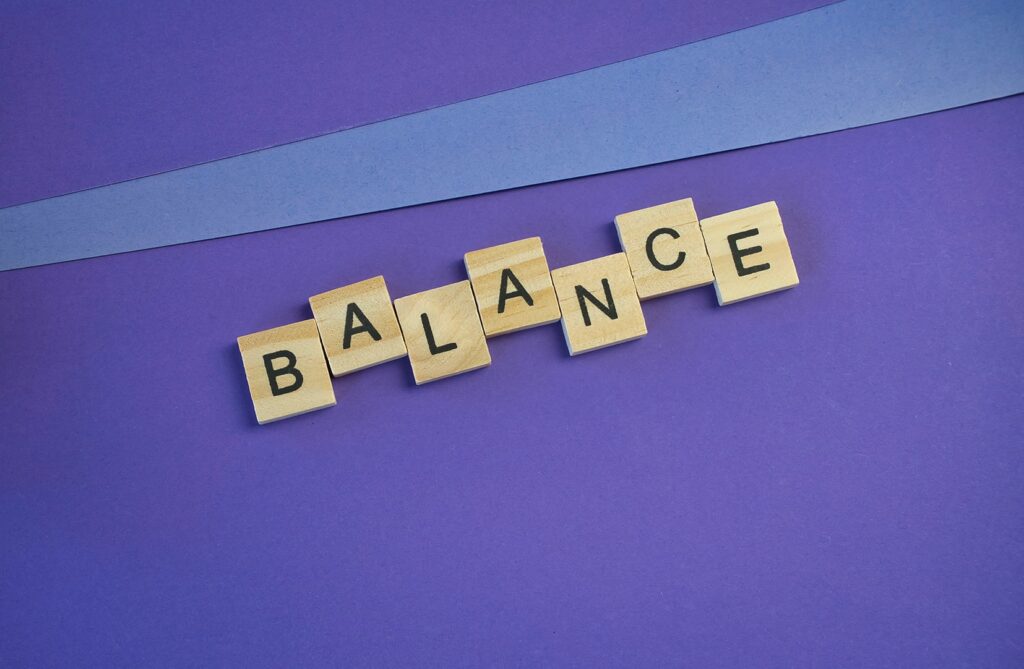If you’ve ever felt like your body is out of sync, you’re not alone. Hormonal imbalances are a widespread issue, affecting both men and women, and can manifest in various forms – from mood swings to unexplained weight changes. In this article, we’ll explore hormones and how natural methods can help restore harmony.
Hormones play a crucial role in our bodies, acting as chemical messengers that influence almost every aspect of our health. From peptide and reproductive hormones to those regulating our sleep and stress, they are the silent conductors of our body’s symphony. When these hormones become imbalanced, it can lead to a range of health issues, including type 2 diabetes, weight gain, and even mood disorders. Many factors can contribute to hormone imbalance, including diet, lifestyle, and stress levels.
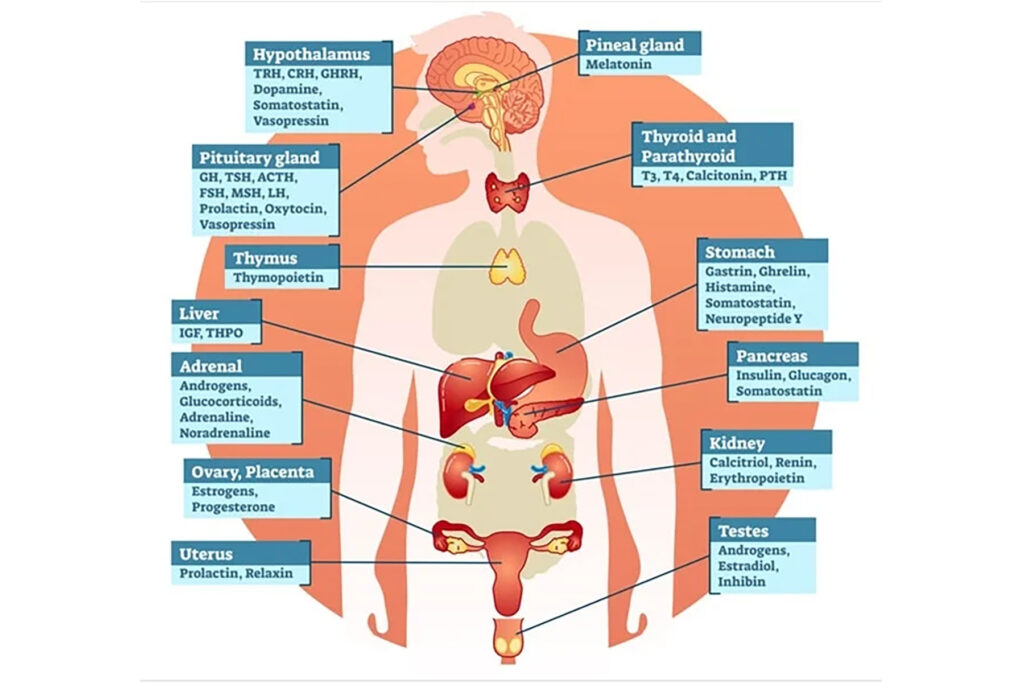
The good news is, there are natural ways to balance your hormones. A key factor in this balance is diet. Consuming a healthy diet rich in anti-inflammatory foods and low in added sugars can significantly impact your hormonal health. Reducing sugar intake, increasing intake of nutrient-dense foods, and maintaining a healthy weight are all effective strategies. It’s also crucial to get enough sleep, as good sleep is directly associated with maintaining a healthy balance of hormones in the body.
Understanding the types of hormones and how they affect our bodies is essential. From sex hormones to those involved in our metabolic processes, each type of hormone has a specific role. We’ll talk about how certain supplements may help balance hormones naturally, how imbalances in these hormones can cause chronic issues and how adjusting your food intake and lifestyle can help balance your hormone levels.

Understanding Hormones and Their Impact
Hormones are incredible chemical messengers, produced by the endocrine glands, like the thyroid, adrenal glands, and pancreas. They travel through the bloodstream, signaling tissues and organs to do their job. Think of them as the body’s communication system, coordinating everything from growth and metabolism to mood and reproductive health.
The different types of hormones can be classified based on their chemical structure. There are three primary classes of hormones:
1. Lipid-Derived Hormones: These hormones are structurally similar to cholesterol and include steroid hormones such as estrogen and testosterone .
2. Amino Acid-Derived Hormones: This type includes small molecules like the adrenal hormones.
3. Peptide Hormones: Peptide hormones are polypeptide chains or proteins and include hormones like insulin, growth hormone, and oxytocin.
Each hormone has a specific role. For instance, insulin regulates blood sugar, while cortisol, the stress hormone, helps in managing stress. It’s a delicate balance – too much or too little of any hormone can throw the whole system off.
Now, when this balance is off, our bodies definitely let us know. You might experience mood swings that seem like an emotional roller coaster, unexplained weight gain or loss, which can be really frustrating or feeling constantly tired, no matter how much you sleep.
Other signs include skin issues, hair loss, and changes in blood pressure or heart rate.
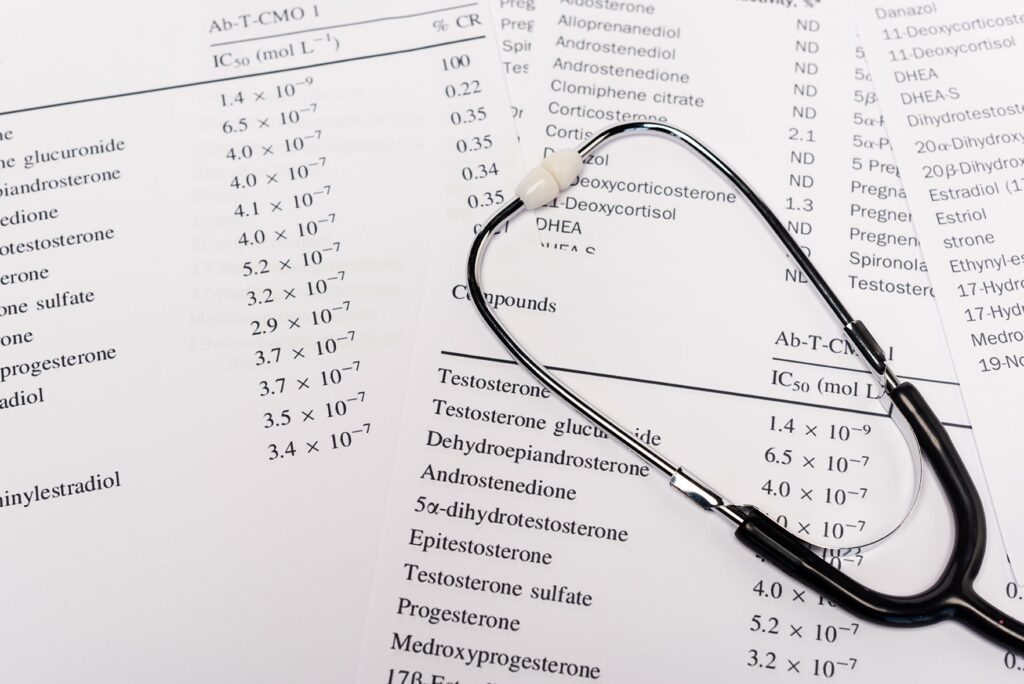
The Importance of Hormonal Testing
When it comes to hormonal health, testing is crucial. I can’t stress enough the need for regular hormonal check-ups. My no1 tip would be to start testing when you’re young! Hormonal imbalances aren’t just a concern for the middle-aged or elderly. These issues can start early, so beginning hormonal testing at a younger age is good idea. It’s all about being proactive rather than reactive.
I remember my first hormonal test. I was feeling off but couldn’t pinpoint why. The test results were a revelation – they showed imbalances that explained so much about my mood swings and fatigue. It was a turning point for me, leading to a more tailored approach to my health.
Understanding your hormone levels is like getting a sneak peek into the workings of your body.
Testing can help identify issues early on, preventing more severe problems down the line and aid in customizing your diet, exercise, and lifestyle to better suit your body’s needs.
Types of Hormonal Tests
Blood Tests: These are common and can measure a range of hormones such as thyroid, estrogen, testosterone, and cortisol levels.
Saliva Testing: Often used for testing cortisol levels, it’s non-invasive and can be done at home.
Urine Testing: This provides a more comprehensive picture of hormone levels over a day.
Each test has its unique role in painting an overall picture of hormonal health. It’s not just about finding what’s wrong, but also about discovering what your body needs to maintain its delicate hormonal balance.
The Reality of Hormonal Imbalance
Hormonal imbalance is more common than many of us realize. It’s not an isolated problem but a growing concern, especially among women. Factors like lifestyle choices, environmental exposure, and genetic predispositions play a role.
Impact of Lifestyle Choices:
Diet: Eating processed foods high in sugar can lead to insulin resistance, disrupting hormonal balance.
Exercise: Regular physical activity helps regulate hormones like insulin and cortisol.
Environmental Factors: We often overlook how our environment affects our hormonal health. Chemicals in plastics, cosmetics, and even our food can mimic or disrupt our natural hormones.
So, I’ve got this friend and last year, she went through something pretty intense. Her hormones just plummeted, and it threw her whole life off balance. You wouldn’t believe it, but despite living what seemed like a really healthy lifestyle – you know, eating well, doing yoga, all that stress-free living stuff – out of nowhere, she just woke up one day feeling like she had hit rock bottom. She was so down, even started having these really dark thoughts about life not being worth living, and she was only 45!
She had never really paid attention to her hormone levels before. No supplements, no checks, nothing. It was a total shock to her system. It turns out, it’s not just about living stress-free or eating right. If your hormones are out of whack, and you’re not supporting them properly – things can go south really fast. It’s like, as you age, your hormone levels can drop, and if you’re not on top of it, it can really affect your mental and physical health.
Realizing she needed help, she reached out to me. Together, we found the best hormone doctor and functional doctor for her. Along with my coaching, we started to get her back on track, little by little. It wasn’t an overnight fix, but a year later, she is feeling so much better. It’s been a journey, but it’s incredible to see the difference. She’s like a new person now. It’s wild how much hormones can impact your life, and it’s an example of how important it is to find the right support and care.

Natural Ways to Balance Hormones
Balancing hormones naturally is a journey that involves diet, supplements, and exercise. It’s about fine-tuning your lifestyle to support your body’s hormonal harmony.
Role of Diet in Hormonal Health
For those struggling with hormonal imbalances, particularly overweight and obese adults, adopting an anti-inflammatory diet may offer numerous benefits. Such a diet, rich in whole foods and low in processed sugars, helps reduce inflammation and supports hormonal health. Natural sweeteners, in moderation, can be a better choice than high-glycemic sugars which can lead to hormonal imbalances and exacerbate food cravings.

Influence of Diet on Hormones:
Blood Sugar Regulation: Foods that stabilize blood sugar levels help in managing insulin, a key hormone that affects many others.
Gut Health: A healthy gut is essential for hormone production, particularly serotonin, which is produced in the gut. Fiber-rich foods promote gut health. See Everything You Need to Know About Gut Health.
Fat Types: Healthy fats are vital for hormone production. For instance, omega-3 fatty acids help in reducing inflammation and balancing hormones.

Dietary Changes for Hormonal Health:
Lean proteins, like chicken and fish, provide the building blocks for hormone production.
Cruciferous vegetables (think broccoli, cauliflower) aid in regulating estrogen levels.
Foods rich in omega-3 fatty acids, such as salmon and flaxseeds, help reduce inflammation and can balance hormone levels.
Fiber-rich foods, including whole grains and legumes, are great for gut health, which is directly linked to hormonal balance.
And of course make sure to include polyphenol rich foods and high vibration foods in your diet!
Foods to Avoid
High sugar and processed foods can lead to insulin resistance, disrupting your hormonal equilibrium. Excessive caffeine and alcohol intake can negatively impact your adrenal glands and cortisol levels.

Supplements for Hormonal Support
DHEA (Dehydroepiandrosterone): This is a hormone produced by the body’s adrenal glands. It serves as a precursor to male and female sex hormones, including testosterone and estrogen. Taking it as a supplement can help balance other hormones, particularly as we age because DHEA levels peak at around age 25 and then decline with age. Some people use DHEA supplements to potentially improve sex drive, build muscle, combat aging effects, and address certain health conditions.
However, scientific evidence supporting these claims is limited, and DHEA supplements carry risks, particularly for individuals with hormone-sensitive cancers. DHEA is also being studied for its potential effects on conditions such as metabolic syndrome, heart disease, and systemic lupus erythematosus. It’s important to consult a doctor before taking DHEA, especially for individuals with diabetes, hormone-sensitive conditions, or high cholesterol. Moreover, it’s really important to test your DHEA levels because your functional doctor can tell you how many milligrams you need. It’s really important to get tested and know the specific milligrams you need to take. This personalized approach ensures that you are taking the correct dosage for your specific needs, which can vary significantly from person to person.

Vitamin D and B Vitamins: Essential for hormone production and balance. They’re especially crucial for those who don’t get enough sunlight or have dietary restrictions.
Probiotics and Prebiotics: They’re not just good for digestion; they also play a role in hormone regulation through gut health.
Adaptogens: Herbs like ashwagandha and Rhodiola can help manage stress and cortisol levels.
Iodine: Essential for thyroid health, iodine supplementation can support overall hormonal function.
Omega-3 Fatty Acids: These not only reduce inflammation but also aid in hormone production and balance. My favorite new acid and a highly effective form of Omega-3 is the Fatty 15.
Also make sure to exercise regularly! Whether you prefer yoga or strength training, regular physical activity can significantly improve hormonal health
A Word of Caution:
Over-supplementing can backfire. It’s essential to remember that more isn’t always better.
Consulting with a healthcare provider is crucial before starting any supplement, especially to avoid interactions with other medications or health conditions.
Supplements, when used correctly, can be powerful allies in achieving hormonal balance. They’ve certainly been a key component in my health journey and that of my clients, but it’s important to approach them with care and knowledge. Remember, they’re supplements, not substitutes for a healthy lifestyle.
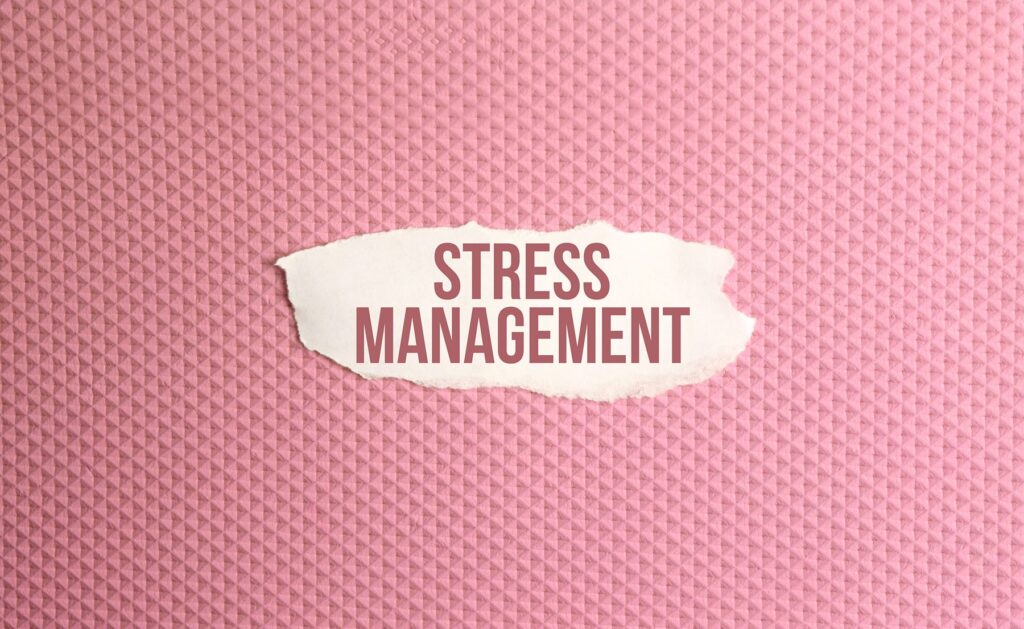
Stress Management and Hormonal Health
Stress, a seemingly inevitable part of modern life, has a more profound impact on our bodies than many of us realize, particularly on our hormones.
The Stress-Hormone Link:
Cortisol Connection: Stress triggers the release of cortisol, known as the stress hormone. While it’s vital in short bursts, chronic stress leads to sustained high cortisol levels, disrupting hormonal balance.
Impact on Other Hormones: Excessive cortisol can throw off other hormones, like insulin, leading to issues like weight gain and fatigue.

My Stress Reduction Techniques:
Mindfulness and Meditation: Practicing mindfulness and meditation has been a game-changer for me. It helped lower my stress levels and, in turn, balance my hormones. I love using Brain Tap for this!
Deep Breathing Exercises: Simple yet effective, deep breathing can reduce stress hormone levels almost instantly.
Setting Boundaries: Learning to say no and setting boundaries around work and personal life helped reduce my overall stress.

Incorporating Stress Management
You’ve got to make stress management a regular thing. It’s like brushing your teeth, you know? Every day, find a bit of time to just chill out and let go of all that tension. It’s not one-size-fits-all either. For some, it’s all about yoga or meditation, it could be as simple as taking a peaceful walk. The trick is to find what vibes with you and just roll with it.
Consistency is super important. It’s like, even if you can only spare a few minutes each day, that’s still golden. It’s all about keeping up with it. You’d be surprised how even a little bit of stress-busting every day can seriously change the game. Just remember to keep at it!

Coaching Sessions
I am currently offering one-on-one coaching sessions to help individuals who may be facing challenges in achieving their goals independently. My goal as a coach is to guide and support you in every step of your journey, while also holding you accountable for the actions you take towards achieving your desired outcomes.
Whether you want to improve your health and wellness, establish better habits, or achieve personal and professional growth, I can provide you with personalized attention, a customized approach that suits your unique needs, and the necessary tools and motivation to help you reach your full potential and transform your life.

The Role of Medical Professionals in Hormonal Health
When I started dealing with my own hormonal rollercoaster, I realized quickly this wasn’t a DIY project. I needed the pros – people who know their stuff inside out. Endocrinologists and functional medicine doctors don’t just throw a one-size-fits-all solution at you. They look at everything – your history, how you live your life, the whole shebang.
For me, they tailored everything to my needs, based on real thorough tests. It wasn’t just about getting better, it was about understanding my body and feeling empowered to make smart choices about my health. It’s all about teamwork. Working with these professionals is like a health collab. You bring your experiences, they bring their knowledge, and together, you figure it out.
And don’t be shy to speak up!
Ask all the questions, raise your concerns. Remember, good communication is key for this to really work.

Quick Recap on Natural Ways to Balance Your Hormones
Get Enough Sleep
Quality sleep is crucial for hormonal balance. It’s when your body repairs itself and regulates hormones like cortisol and insulin.
Aim for 7-8 hours of sleep per night to help keep your hormone levels steady. I take magnesium bio optimizer and melatonin before bed, see the benefits of melatonin here.
Also I recommend using the Oura ring to help you! See my full guide to perfect sleep here.
Be Careful with Your Sugar Intake
High sugar intake can lead to insulin resistance, disrupting hormonal balance.
Try to minimize processed sugars and opt for natural sweeteners in moderation.
Balancing your sugar intake can stabilize your hormones and improve your overall health. High vibration foods are so much better for you than processed sugars!

Getting Enough Sunlight
Sunlight is vital for vitamin D production, which plays a key role in hormone regulation. Practice earthing and grounding. It absolutely makes a difference.
Aim for a few minutes of sun exposure daily, especially in the morning as sunlight can improve both mood and support healthy hormonal function.
Eat Healthy Fats
Healthy fats are essential for hormone production and balance.
Include sources of omega-3 fatty acids like fish (make sure to buy wild caught!), avocados, and nuts in your diet.
These fats can reduce inflammation and support overall hormonal health.
See my article on Benefits of Moringa Powder here (it can help with weight loss and immunity!)

Pay Attention to Your Gut Health
A healthy gut is directly linked to balanced hormones.
Include probiotic and fiber-rich foods in your diet to support gut health.
Good gut health can improve hormone regulation and overall well-being.
Additionally, it’s crucial to test your microbiome, as it will give you significant insight into what specific actions to take for optimal gut health. Viome offers an amazing test to analyze your gut microbiome and provides detailed information on your gut’s health and helping guide your dietary and lifestyle choices to better support gut health.
You can also get their Full Body intelligence test here for a more comprehensive full body test and make sure to use my PROMO CODE: Nataliahealth for $20 off!
Testing! Do a Hormone Test
Regular hormone testing can help identify imbalances early on.
Tests can reveal the need for dietary changes, supplements, or lifestyle adjustments.
Understanding your hormone levels is key to personalized and effective hormonal health management.
Incorporate Regular Exercise
Exercise helps regulate hormones like insulin and reduce stress levels.
A mix of cardio, strength training, and flexibility exercises can optimize hormonal health. I love bouncing on my rebounder! See my article on trampoline benefits here.
Regular physical activity helps your body cope with stress and maintain a healthy weight, both of which are important for hormonal balance
And of course, learn to manage your stress and consult with healthcare professionals!

Conclusion
Hormones affect every aspect of our being, from our mood to our physical health. Imbalances in these hormones can lead to a range of issues, including weight gain, insulin resistance, and mood fluctuations. It’s crucial to recognize that hormones are involved in almost every bodily process, and maintaining a healthy hormone balance is vital for overall wellness.
As we conclude this guide on naturally balancing your hormones, please remember that achieving hormonal harmony involves a multifaceted approach. Our journey through the complex world of hormones, from peptide hormones to those regulating our metabolism and stress, highlights the profound impact they have on our overall health. It’s about finding a balance that works for you and supports the intricate network of glands and hormones in your body.
With patience, persistence, and a willingness to adapt and learn, achieving a healthy hormone balance is possible. Remember, you’re not just balancing hormones, its all about creating a foundation for a healthier, happier life.

FAQs
To improve your hormonal health, focus on a balanced diet, regular exercise, stress management, and adequate sleep. These lifestyle changes can significantly impact your hormonal balance.
Common symptoms include weight gain, fatigue, mood swings, sleep disturbances, and changes in appetite or sex drive.
Treatment options vary depending on the specific imbalance but may include lifestyle changes, hormone therapy, dietary adjustments, and supplements.
Yes, a diet rich in whole foods, healthy fats, and low in processed sugars can help balance hormones naturally.
Hormone levels affect various bodily functions including metabolism, reproductive health, mood regulation, and energy levels.
Key glands include the pituitary, thyroid, adrenals, pancreas, and reproductive glands (ovaries and testes).
Lifestyle changes such as reducing stress, maintaining a healthy weight, exercising regularly, and eating a nutrient-rich diet can help balance hormones.
Good hormonal health supports various body systems, reducing the risk of chronic diseases and improving quality of life.
Yes, amino acids are essential building blocks for hormones and support healthy hormone production.
Yes, hormonal imbalances, particularly in insulin and cortisol, can lead to weight gain and difficulty in losing weight.
Yes, imbalances in hormones like cortisol can contribute to insulin resistance, impacting blood sugar control.
Hormone imbalances can occur due to aging, stress, unhealthy lifestyles, and during life transitions like puberty, pregnancy, and menopause.
Natural methods include eating balanced meals, incorporating foods like leafy greens and fatty fish, regular exercise, stress reduction, and proper sleep.
Supplements can be helpful, but it’s important to consult with a healthcare professional to ensure they are appropriate for your specific needs and do not interfere with other medications.
Additional Resources

With a positive approach and a motivation mindset, you will reach your health goals, no matter how hard they may seem at first. Learn more about my one-on-one coaching program here.

